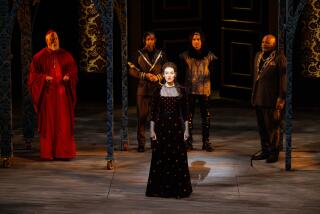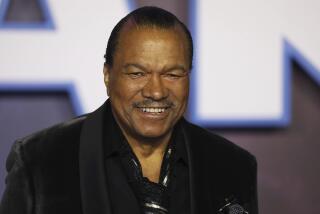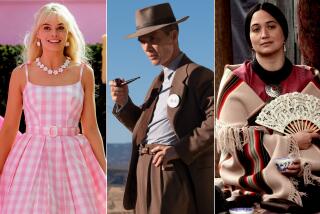Lord Olivier: To ‘Sir’ With Love : A Rich and Romantic Legacy of Film Roles to Learn From
- Share via
Young movie audiences today can learn about drug deals, about ghosts, busted or not, about sex, safe or otherwise. Where do they learn about romance? From “Wuthering Heights,” and a burning-eyed actor with an unheroic nose and a slyly curling mouth, an actor who dropped a coal into the hearts of moviegoers, fanned it the next year with “Rebecca,” and added to it with “Pride and Prejudice.”
Certainly Laurence Olivier’s movies taught us more than romance--in the midst of the war, his “Henry V” made the essential quality of English endurance more clear to Americans than the most ringing exhortations of Winston Churchill ever did. It was patriotism at its purest.
Yet if he got to you at the right age, it may be that dark vein of romance in Olivier that lasted longest. He set standards, damn him, that no mere American high school boy was ever going to match; a quality of looking up from the contemplation of a love so all-encompassing that it dazed him slightly. His Heathcliff had that; his Maxim de Winter did too. And he set the seal on it with his fine, contemptuous Darcy, unbending to find love in “Pride and Prejudice.”
Americans probably owe Olivier the debt of his Shakespeare films, first, of course “Henry V,” which he reluctantly directed as well as starred in. He had hoped to have William Wyler direct it, feeling, humbly, that in “Wuthering Heights” Wyler had brought him down from his perch of snobbishness about movie acting. But Wyler pushed him to do it himself, and the result, although not perfect, had moments of cinematic astonishment: the flight of the arrows; the pulling back from stage to action; the massed battle scenes; Henry’s ringing speech before the battle of Agincourt contrasted with the sweet ardor of his wooing the French princess Katharine.
“Hamlet” was next, inky-beautiful and argued about. If in some of its transpositions and abridgements it was a “Hamlet” for mass audiences, then we in its mass audience had a great deal to be grateful for: clarity, production, absolutely ideal casting in every role and moving performances.
He would give us a malevolent, sardonic Richard in “Richard III” before he was through and an “Othello” that, although it was more a filmed record of a theatrical performance, was bold and uncompromising. There was even a bit of Olivier in the Zeffirelli “Romeo and Juliet,” an unbilled reading of the prologue and epilogue for which he wished no credit, but which one reviewer praised as “the only voice able to take the measure of Shakespeare.”
There would be more than a dozen distinguished non-Shakespearean roles over the decades, including another appearance for Wyler in “Carrie,” but the most coruscating performance was his Archie Rice in “The Entertainer,” John Osborne’s painful metaphor for a crumbling Britain wrapped up in the body of a fifth-rate music-hall comic. There was a sense, with the middle and late films, of work taken, as he frankly said, to provide for the children of his third marriage (to Joan Plowright).
Of these movies, his malevolent Dr. Szell in “Marathon Man” would probably keep people out of dentist’s chairs for another decade or so, and “Sleuth,” a chamber piece with Michael Caine, was a crackling duel with matched opponents, with subtlety checked at the door. His American car magnate in “The Betsy” would send most of his devotees back to his early movies in order to shore up their allegiance. Then, of all places, television righted the record proudly with “Brideshead Revisited,” and his poignant, iron-willed head of the lordly family.
Hard to explain to young audiences, who may have come in on Olivier’s all-purpose mittel -European-accent period, that here was the ringing figure of our times. Fortunately, almost all of his power, his presence, is here on video. (Not, alas, his “Three Sisters,” done for American Film Theater.) New generations can sift through what is left behind, can see the stable boy, the young king, the haunted passionate husband, the vulgar vaudevillian, and take the proper measure of the actor who arched over all our decades.
More to Read
Only good movies
Get the Indie Focus newsletter, Mark Olsen's weekly guide to the world of cinema.
You may occasionally receive promotional content from the Los Angeles Times.










